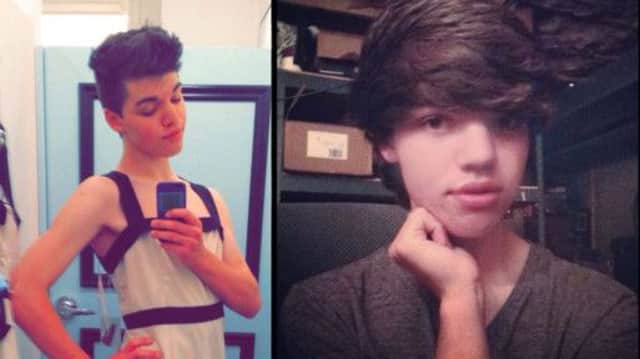Dani Garavelli: Is it too much to ask for quick fix?


Leelah, whose birth-name was Josh, was just 17 when she apparently killed herself on 28 December. There’s a photograph of her in typical schoolgirl pose, a short frock, hands on hips, but with none of the brash confidence that usually marks out Facebook profile pictures. Instead she looks waif-like, diffident, wistful. When you read her suicide note, you understand why.
Having “come out” to her Christian parents, Leelah was told the person she knew herself to be was unacceptable in the eyes of God and society. She wanted to transition; they sent her for conversion therapy. Perhaps the saddest part of her message was when she described “crying of happiness” at the age of 14 on first hearing the word “transgender”. That flicker of self-esteem was snuffed out by parents who loved her, not unconditionally as they have professed, but sub- ject to her conforming to their own narrow concept of gender identity.
Advertisement
Hide AdAdvertisement
Hide AdLeelah had the misfortune to be born to religious fundamentalists in Ohio, the heart of the US Bible belt. But surveys have shown homophobic bullying is rife in Scottish schools and that LGBT youngsters are significantly more likely than their straight peers to self-harm and contemplate suicide, so we are not immune to discrimination.
I can’t imagine anyone would want Leelah’s experience to impinge on the joy of those same-sex couples who are finally able to marry here; nor should it detract from the pride the country takes in being at the forefront of LGBT equality. When I saw pictures of Susan and Gerrie Douglas-Scott exchanging their vows, I thought back to a night I spent with gay friends no older than Leelah in the mid-1980s. They held hands under a coat they’d draped over their knees while all around them straight boys and girls made out. I am glad that now – wherever they are and whoever they’re with – they no longer need to love so surreptitiously.
But social mores don’t always march in time with the law. We know there are religions, cultures and even professions where LGBT people continue to be stigmatised. You can legislate all you like, but it will be a long time, I suspect, before we see a pair of gay footballers signing the marriage register in Scotland. And in the LGBT community, transgender people are the least understood and the most discriminated against of all.
In the wake of Leelah’s death, much hostility has been directed towards her parents who continue to refer to her as their “son”. Compare their attitude to that of Australians Yoland Bogert and Guy Kershaw, who – responding to their son’s decision to transition – published a retraction of their original birth notice, 19 years earlier, announcing the arrival of Elizabeth Anne as their daughter. “Oops. Our bad,” they wrote, “We would now like to present our wonderful son, Kai.” Kai’s own reaction demonstrated the difference such positivity can make. “I am still me, but I am more me than I was a few days ago and feel free,” he said.
Even so, I don’t think hounding and threatening the bereaved is any way to behave. Leelah’s parents have paid a high price for their ignorance – an ignorance that is, likely, a product of their own narrow upbringing. Like other parents of teenagers who kill themselves, they have a lifetime to torment themselves with what they could have done. And – though gay rights activist Dan Savage has called for it – I certainly don’t believe they should be prosecuted. On what grounds? In any case, taking them to court would only encourage further suicides and feed religious groups’ siege mentality.
Much as she hated her parents, Leelah didn’t ask for that; she asked for more education on transgender issues within schools, for greater understanding. That’s why, in this case, it seems acceptable that her note – which, according to the Samaritans’ best practice, should not be published – has gained some traction. It provides a powerful insight into the damage it is possible to inflict on a human being by not accepting them as they are (although suicides are always complex, not attributable to a single trigger). Talking about Leelah’s note has also ramped up the pressure on politicians to legislate against conversion therapy, which, while ruled unethical by the British Association for Counselling and Psychotherapy, is not illegal.
The most distressing aspect of Leelah’s death is the waste. Despite her unhappiness, there was every chance this talented musician and artist would have grown up, moved away, transitioned and built a good life. Her parents might even have come round.
A petition is calling for Leelah’s parents to put her chosen name on her tombstone. I hope they take heed and grant their daughter, in death, the gender identity they denied her in life. But more than that, I hope her suicide prompts a degree of reflection, particularly among the ultra-religious who have the biggest journey to make. “Fix society, please,” Leelah said. That’s a big ask. But it’s not impossible.«
Twitter: @DaniGaravelli1
To contact Samaritans for emotional support, call 08457 90 90 90 or email [email protected]